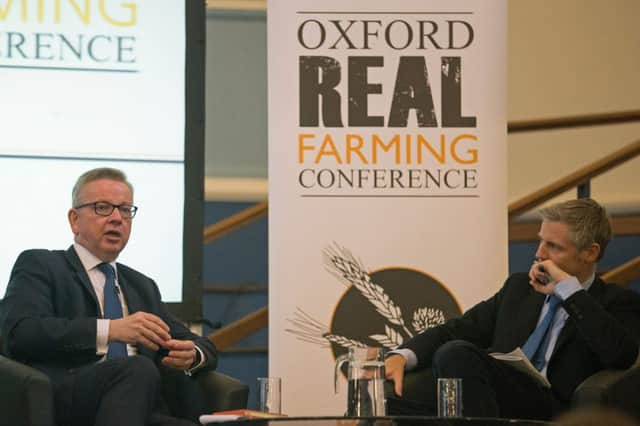The devil will be in the detail from conference speech


The tradition then was that the minister of the day delivered the keynote speech. This year, with the DEFRA Secretary Michael Gove, we were back to that. He delivered a headline grabbing speech on his plans for a post Brexit farming policy. This went down well with the wider public, who liked the promise of a greener farming model, more access to the countryside and higher animal welfare standards. That was no surprise, given that Gove is a skilled politician – but the bigger question is whether he really did say anything new, and whether he did enough to convince farmers the government has a realistic plan for agriculture.
Gove said current funding arrangements would stay in place until 2022. This was already a pre-election commitment of the Conservative party, so there is nothing new in that. He also suggested funding could continue for a two-year transition period. This is welcome news for farmers, even if it is not guaranteed. Where he was short on detail was on the mechanisms to make these payments. The government has said the UK will leave the CAP in March 2019, so if we are not in the CAP how will direct payments be made and what rules will apply. This is the detail farmers need, not well-presented political spin from a minister whose ambitions are unlikely to be to remain at DEFRA. Gove is an ambitious politician, one of the architects of the UK leaving the EU, and for his efforts he will want a bigger legacy than a new agricultural support model.
Advertisement
Advertisement
Funding issues apart, farming is a long term business and the ultra-green plan Gove is now talking about has to raise concerns. He is right in saying there are big flaws in a system that makes some large landowners CAP-support millionaires every year. However while those figures grab headlines, scale does not guarantee profitability and most large farms are as dependent on direct payments to make ends meet as family farms. This drive against large CAP recipients by a Conservative agriculture minister is ironic. Go back to the early 1990s and the MacSharry reforms when he wanted to cap payments in a process dubbed degressivity. Opposition was led by the then Conservative agriculture minister, John Gummer. Had he not prevailed we would never have had the spectacle of CAP millionaires, and it has taken his party close to thirty years to learn that this is unacceptable.
The devil in the detail for farmers is what comes after the direct payments model. In a straight appeal to urban voters Gove is openly saying farmers should only be rewarded for environmental gains – the delivery of public good. This includes payments for opening their land for people to roam across. This is a big change in concept. Food production will no longer be part of the equation. That is a break from what has driven UK farm support policy through the CAP years and in the era of deficiency payments before we joined the then EEC in 1973. This will also differ from the post 2020 CAP, which despite greening elements and cross compliance is still rooted in food production. This is a dangerous road for the food security of the nation and the relevance of farmers as suppliers of raw materials to support the food industry as a key part of the UK economy. This really is about turning farmers into park keepers.
The other somewhat hollow claim by Gove in Oxford was that he would maintain standards in food quality. He did not explain how he would square this with his cabinet colleagues Liam Fox, as trade minister, and Boris Johnson who are both determined to secure big free trade deals around the world. Part of that will be to open the UK food market to imports, and despite what Gove says it is hard to believe the government will insist on higher standards than those that apply internationally. It has always been the reality that food is just a pawn in a much bigger game.
Indeed UK farmers could end up with higher standards to please urban voters, while facing competition from imports that do not even approach the same standards. All in all a case of not allowing the need for cynicism about politics and politicians to be dispelled by one well delivered speech in Oxford.